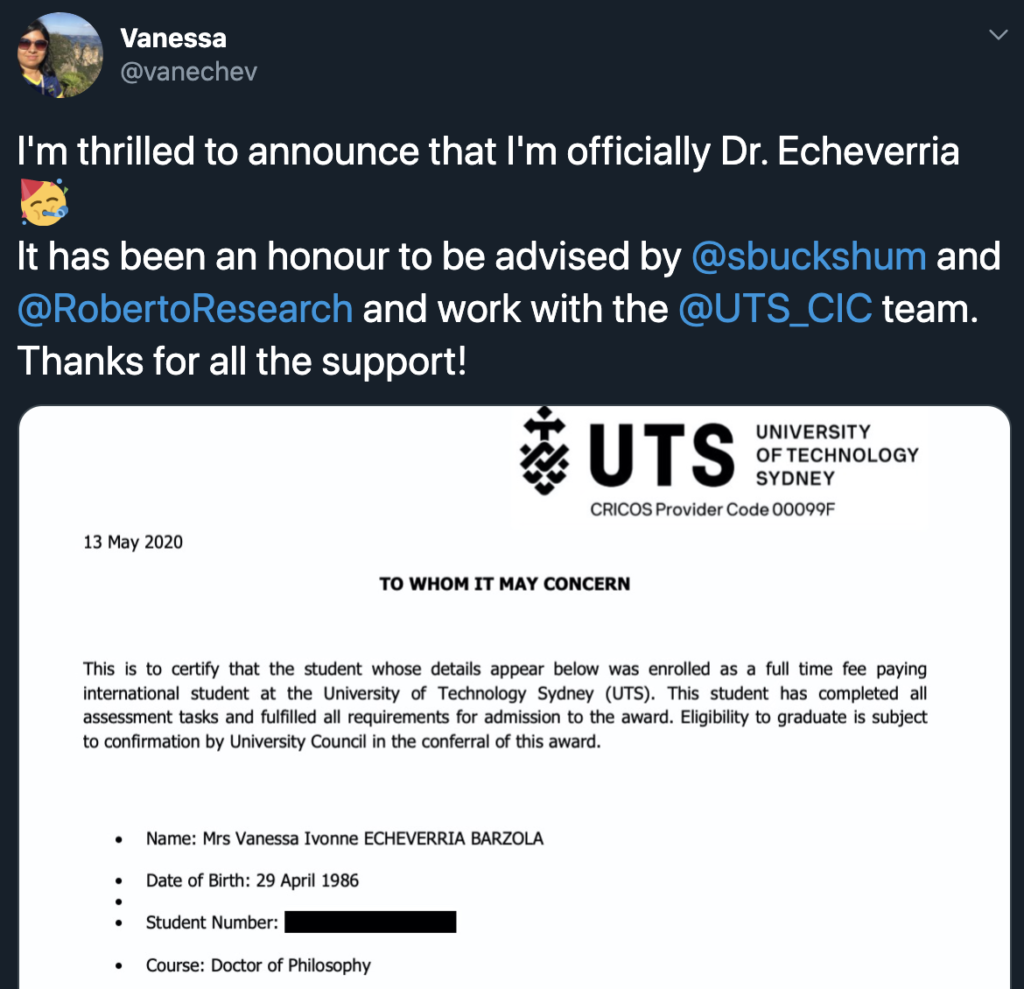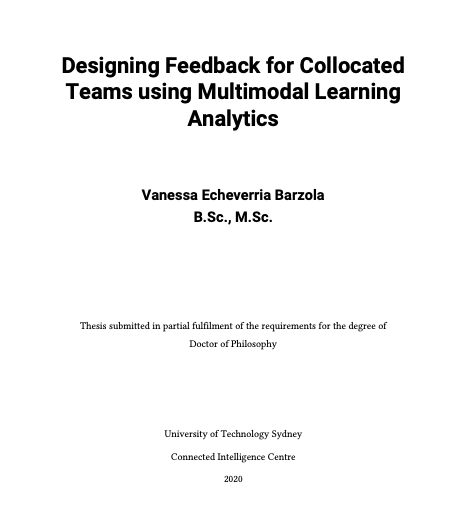 We’re delighted to announce that Vanessa Echeverria has graduated from our Learning Analytics Doctoral Program! She submitted a thesis that required just a few typographical fixes, earning the praise of her international examiners.
We’re delighted to announce that Vanessa Echeverria has graduated from our Learning Analytics Doctoral Program! She submitted a thesis that required just a few typographical fixes, earning the praise of her international examiners.
 Co-supervised by Roberto Martinez-Maldonado and Simon Buckingham Shum, and working closely with UTS Faculty of Health academics, her research broke new ground with the development of multimodal analytics to provide visual feedback to teams of nurses in the simulation wards. You can read the news stories about her work over the last four years, the papers on her website, and of course, the thesis is now published by UTS (see below). We wish her every success in her future career!
Co-supervised by Roberto Martinez-Maldonado and Simon Buckingham Shum, and working closely with UTS Faculty of Health academics, her research broke new ground with the development of multimodal analytics to provide visual feedback to teams of nurses in the simulation wards. You can read the news stories about her work over the last four years, the papers on her website, and of course, the thesis is now published by UTS (see below). We wish her every success in her future career!
Truly the tweet that every doctoral researcher dreams of posting!…
Thesis: Designing Feedback for Collocated Teams using Multimodal Learning Analytics
 ABSTRACT: The ability to communicate, be an effective team or group member and collaborate face-to-face are critical skills for employability in the 21st century workplace. Previous research suggests that learning to collaborate effectively requires practice, awareness of group dynamics and reflection upon past activities. However, although having a teacher closely supervising and providing detailed feedback to each group would be ideal, it may be unrealistic in practice. A promising way to approach this challenge could be to capture behavioural traces from group interactions in order to generate comprehensible and actionable feedback to support team reflection. In this sense, Multimodal Learning Analytics (MMLA) is a promising field, offering the potential to track learners’ activity across digital and collocated contexts, using emerging sensing and pervasive computing technologies. Most of the research in MMLA has been conducted in lab conditions, to help researchers validate learning theories or generate more comprehensive learner models. However, one of the most underexplored aspects of MMLA has been the generation of feedback to support teaching and learning, and moreover, in authentic locations and activities. This thesis reports progress in tackling this challenge by designing and validating computer-based feedback, by means of visual representations and narrative, to support effective, guided reflection using multimodal learning analytics evidence. To achieve this, three contributions are presented. The first contribution is a human-centred design method to translate the informal outputs of co-design sessions with teachers and students, into more meaningful group work constructs with clear MMLA design requirements. The second contribution is a modelling approach to add meaning to low-level multimodal group data based on the characteristics of the context (domain expertise, theory, and the learning design). Finally, the third contribution is an approach for augmenting visual representations with data storytelling elements to facilitate the interpretation of group dynamics insights by educators and students. This thesis is developed in the context of two distinct, collocated group work settings, in the domains of collaborative database design and healthcare simulation. Using a Design-Based Research process, a set of explanatory interfaces (i.e. interfaces that communicate insights) was designed and validated with teachers and students. The thesis provides timely and necessary groundwork for researchers and practitioners to design visual representations capable of communicating actionable insights, using multimodal data in complex and authentic collaboration scenarios.
ABSTRACT: The ability to communicate, be an effective team or group member and collaborate face-to-face are critical skills for employability in the 21st century workplace. Previous research suggests that learning to collaborate effectively requires practice, awareness of group dynamics and reflection upon past activities. However, although having a teacher closely supervising and providing detailed feedback to each group would be ideal, it may be unrealistic in practice. A promising way to approach this challenge could be to capture behavioural traces from group interactions in order to generate comprehensible and actionable feedback to support team reflection. In this sense, Multimodal Learning Analytics (MMLA) is a promising field, offering the potential to track learners’ activity across digital and collocated contexts, using emerging sensing and pervasive computing technologies. Most of the research in MMLA has been conducted in lab conditions, to help researchers validate learning theories or generate more comprehensive learner models. However, one of the most underexplored aspects of MMLA has been the generation of feedback to support teaching and learning, and moreover, in authentic locations and activities. This thesis reports progress in tackling this challenge by designing and validating computer-based feedback, by means of visual representations and narrative, to support effective, guided reflection using multimodal learning analytics evidence. To achieve this, three contributions are presented. The first contribution is a human-centred design method to translate the informal outputs of co-design sessions with teachers and students, into more meaningful group work constructs with clear MMLA design requirements. The second contribution is a modelling approach to add meaning to low-level multimodal group data based on the characteristics of the context (domain expertise, theory, and the learning design). Finally, the third contribution is an approach for augmenting visual representations with data storytelling elements to facilitate the interpretation of group dynamics insights by educators and students. This thesis is developed in the context of two distinct, collocated group work settings, in the domains of collaborative database design and healthcare simulation. Using a Design-Based Research process, a set of explanatory interfaces (i.e. interfaces that communicate insights) was designed and validated with teachers and students. The thesis provides timely and necessary groundwork for researchers and practitioners to design visual representations capable of communicating actionable insights, using multimodal data in complex and authentic collaboration scenarios.
2 thoughts on “Congratulations Dr Vanessa Echeverria!”
Comments are closed.